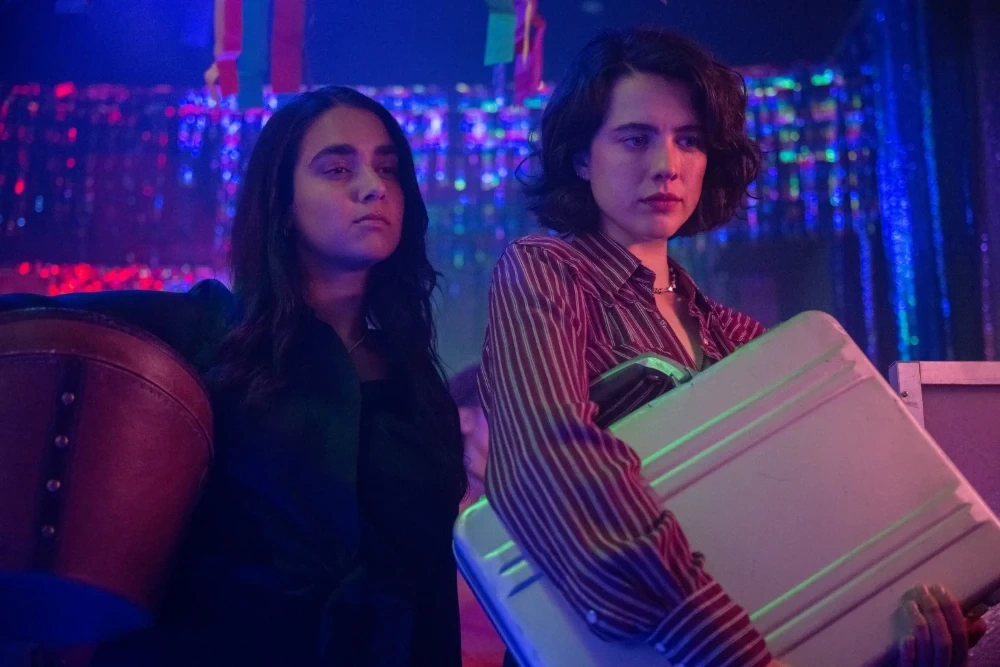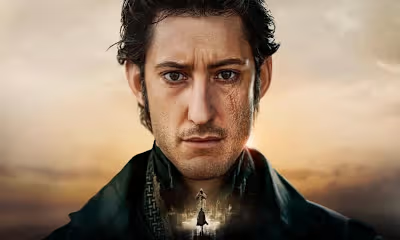DRIVE-AWAY DOLLS

United States – 2024
Genre: Comedy, Thriller
Director: Ethan Coen
Cast: Margaret Qualley, Geraldine Viswanathan, Beanie Feldstein, Colman Domingo, Joey Slotnick, Bill Camp, Matt Damon, Pedro Pascal, Miley Cyrus…
Music: Carter Burwell
Runtime: 94 minutes
Distributor: Universal Pictures France
Release Date: April 3, 2024
SYNOPSIS
Jamie and Marian, two lesbian friends in desperate need of an escape from their daily lives, rent a car for free from Auto DriveAway to head to Tallahassee—unaware that their vehicle contains a highly coveted briefcase sought after by a group of dangerous, yet utterly incompetent, criminals.
A Psychedelic Road Trip
Jamie and Marian, two lesbian friends in desperate need of an escape from their daily lives, rent a car for free from Auto DriveAway to head to Tallahassee—unaware that their vehicle contains a highly coveted briefcase sought after by a group of dangerous, yet utterly incompetent, criminals.
Although the film remains a comedy, Drive-Away Dolls inevitably invites comparisons to previous female-led road trip movies, from the cult classic Thelma & Louise to the lesbian love story Desert Hearts, without quite reaching the heights of these masterpieces. It also marks the latest Coen brother film produced by Working Title Films, struggling to live up to legendary predecessors like Fargo and The Big Lebowski.
Comedy is always tricky to judge, as humor is highly subjective. However, the film seems to suffer from an overreliance on easy jokes, often executed with a heavy hand. The decision to apply a traditionally crude, male-dominated humor style to a duo of lesbian women could have been refreshing, but the problem lies in the relentless exaggeration. The gags, particularly those revolving around raunchy and stereotypical themes, feel repetitive and uninspired. Simply transplanting tired jokes onto a female duo—dildo in hand—doesn’t automatically breathe new life into them.
Brief appearances from Matt Damon, Pedro Pascal, and Miley Cyrus, intercut with psychedelic imagery, tease the mystery behind the briefcase at the film’s core. However, the actual discovery of the briefcase only occurs halfway through—40 minutes into a series of recycled jokes and obsessions that could have easily been cut in half. The result feels artificially stretched, as if the film were desperately trying to pad its runtime with predictable humor.
On the positive side, however, the antagonists complement each other quite well. The idea of a gangster so old-fashioned that he refuses to harm a woman while chasing a female duo, alongside another who insists on dialogue even in the most dramatic situations—both led by the group’s one true menace, played by Colman Domingo (previously seen in Fear the Walking Dead)—manages to deliver some laughs.
A Redundant Representation of a Lesbian Couple
The duo formed by the two main characters works fairly well, despite Jamie often overshadowing Marian, whose more introverted nature contrasts with her friend’s outgoing personality to the point of sometimes making her fade into the background. Margaret Qualley and Geraldine Viswanathan, however, rise to the challenge of their roles. They are convincing, and there is genuine chemistry between these two unlikely companions who, apart from their sexual orientation, seem to have little in common.
The film’s other title is Drive-Away Dykes, which is a more casual term for lesbian women. The duo is queer, and it feels as though the directors and writers are afraid we might forget this: they remind us often, and very frequently in the most sexual way possible. Of course, a comedy is not necessarily meant to give depth to its characters—they are perfectly entitled to be wild and have unrestrained morals in quirky films—but the heroines’ lesbianism here revolves solely around their constant desire (or attempts) to seduce or spend a night with other women. The constant flow of scenes centered around this theme quickly grows tiresome.
Tricia Cooke, the film’s screenwriter and producer, is herself a lesbian and in a ‘non-traditional’ marriage with Ethan Coen. Therefore, it would be inappropriate to assign intentions to the film that it does not have, such as seeing the unhealthy obsessions of a heterosexual man with a couple of women. Drive-Away Dolls is Cooke’s way of representing sexual minorities on screen, and this will undoubtedly not appeal to everyone. One scene, in particular, stands in stark contrast to the rest. The intimate scene between the two heroines is not voyeuristic and is clearly simpler, less caricatured in its direction, compared to the other female-female relationships depicted earlier in the film. It shows that it is indeed possible to have a portrayal that avoids ridicule and is more authentic.
A comedy could totally be made about flirting between women—a lesbian Hitch following the misadventures of women seeking love, trying to navigate the very different codes of the female dating world, much like the recent Bottoms does in its own way. A Queer American Pie might have been more sincere and could have attracted a certain audience because, despite its heavy-handedness and sexually charged subtext, the final product is clearly not any more ridiculous than the series of films that became cult classics for a generation. And that’s partly because it fully embraced what it was.
A Film with Unfulfilled Promises
In reality, it feels like the road trip set against a backdrop of criminal activity could have been left out entirely, as it ultimately seems absent. This may be the main problem with the narrative structure, which fails to live up to its initial promise. Perhaps Drive-Away Dolls ventured down a risky path by trying to blend two genres that, this time, do not complement each other, with one clearly dominating the other. The quickly dispatched threat is barely even a threat, and the presence of the villains chasing the duo almost feels unnecessary. This will likely disappoint some of the audience who were expecting more.
A lot of promises for a result that feels like a missed opportunity, a story that could have been more developed by removing the scenes simply included to string together easy jokes that could have been left out. The basic idea was good, and the film deserves to be seen out of curiosity for Ethan Coen’s solo adventure with his wife, Tricia Cooke. However, it’s unlikely to remain memorable and will not appeal to those who are not fans of American Pie-style humor. And what a waste to bring in Pedro Pascal and give him so little screen time! (personal opinion).

Like this project
Posted Mar 29, 2025
Review of the movie Drive-Away Dolls.
Likes
1
Views
12








